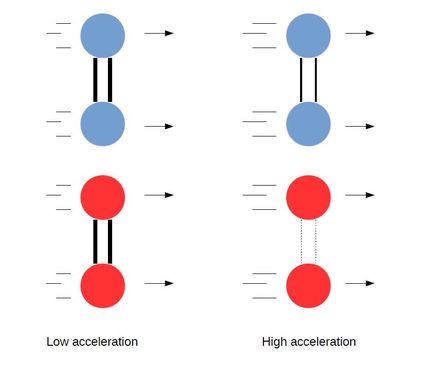Acceleration degrades entanglement in Bell pairs differently
When two objects are entangled, they contain powerful quantum correlations, that cannot be simulated with classical systems, and that are a key resource for quantum computation, quantum cryptography and quantum metrology. However, over the last decade it was established that when one or both objects are accelerated, these quantum correlations are significantly degraded, and may even vanish altogether. This occurs, for example, when the objects hover over a black hole.
But is there any way to mitigate this unavoidable loss of quantum correlations due to acceleration? The answer, B. Richter and Y. Omar have found, is yes, as reported in the article Degradation of entanglement between two accelerated parties: Bell states under the Unruh effect, published in Physical Review A. In particular, they have discovered that the degradation of entanglement depends on the initial state of the objects, even when all considered initial states belong to the family of Bell states, i.e. they all contain the maximal quantum correlations allowed between two objects. The authors have established which maximally entangled states are more robust to acceleration, and which are very fragile in this respect.
But is there any way to mitigate this unavoidable loss of quantum correlations due to acceleration? The answer, B. Richter and Y. Omar have found, is yes, as reported in the article Degradation of entanglement between two accelerated parties: Bell states under the Unruh effect, published in Physical Review A. In particular, they have discovered that the degradation of entanglement depends on the initial state of the objects, even when all considered initial states belong to the family of Bell states, i.e. they all contain the maximal quantum correlations allowed between two objects. The authors have established which maximally entangled states are more robust to acceleration, and which are very fragile in this respect.
Different Bell pairs (represented in blue and red)
lose different amounts of entanglement under the same acceleration.
lose different amounts of entanglement under the same acceleration.
Furthermore, B. Richter and Y. Omar were able to explain the underlying mechanism behind this surprising phenomenon. In general, the loss of quantum correlations is due to particle production, which can – in an intuitive way – be seen as the heat dissipated by the system being accelerated. They found that what makes the difference is whether the initial entangled states can be distinguished from these “thermal particles”: when that is not the case, the entanglement vanishes.
For more details, see the article:
B. Richter, Y. Omar, Degradation of entanglement between two accelerated parties: Bell states under the Unruh effect, Phys. Rev. A 92, 022334 (2015). Get PDF
